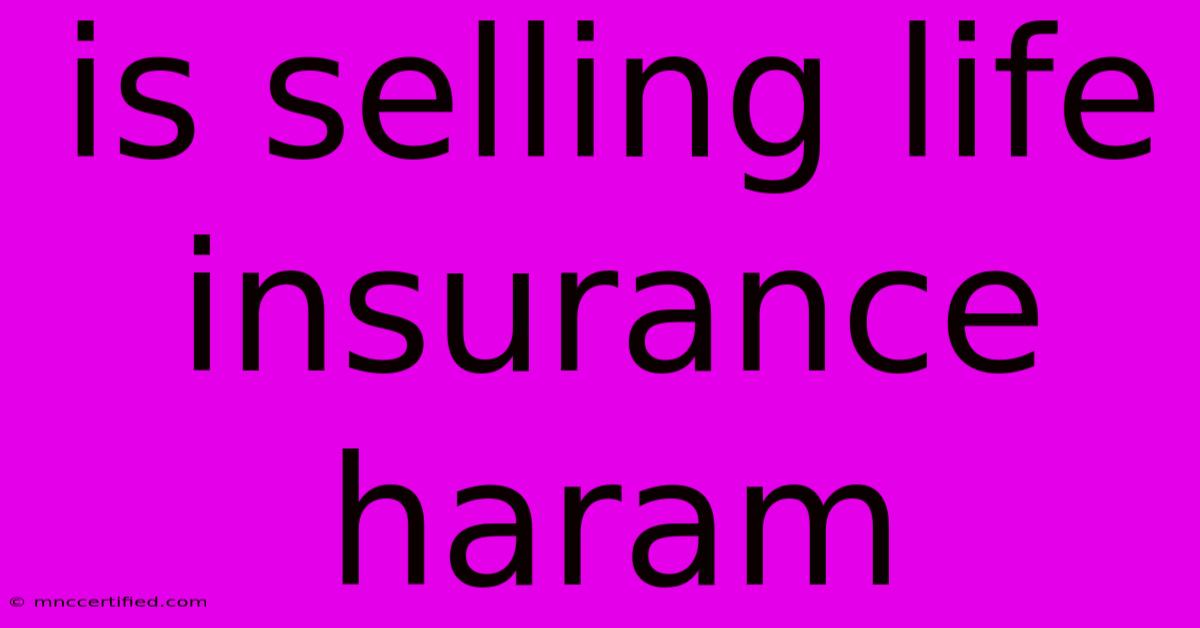Is Selling Life Insurance Haram

Table of Contents
Is Selling Life Insurance Haram? A Comprehensive Islamic Perspective
The question of whether selling life insurance is haram (forbidden) in Islam is a complex one, lacking a universally agreed-upon answer. Many Muslims grapple with this issue, considering various interpretations of Islamic law and principles. This article aims to provide a comprehensive overview of the debate, exploring different viewpoints and considerations to help you form your own informed opinion.
Understanding the Core Concerns
The primary concerns regarding life insurance from an Islamic perspective revolve around these key areas:
1. Gharar (Uncertainty):</h3>
A significant objection to conventional life insurance is the element of gharar, or excessive uncertainty. The contract's outcome is uncertain; the insured might die early, receiving less than paid, or live longer, resulting in a net loss for the insurance company. This uncertainty violates Islamic principles that promote fair and transparent transactions. Many Islamic scholars believe this element of uncertainty renders standard life insurance contracts haram.
2. Riba (Interest):</h3>
While not directly involved in the insurance contract itself, the potential for riba (usury or interest) in investment strategies used by insurance companies is a concern. If the insurance company invests premiums in interest-bearing accounts or instruments, the profits generated could be considered haram, thereby indirectly tainting the entire insurance process.
3. Maysir (Gambling):</h3>
The element of speculation, where the payout depends on an uncertain future event (death), raises concerns about maysir, which prohibits gambling and transactions based solely on chance. This argument suggests that life insurance resembles a gamble, making it religiously problematic.
Arguments in Favor of Life Insurance (with modifications)
Despite the challenges, some argue that life insurance can be permissible under certain conditions:
-
Takaful Insurance: Takaful insurance, often referred to as Islamic insurance, is designed to address the concerns surrounding conventional life insurance. It operates on a cooperative principle, pooling contributions from participants to provide coverage based on mutual assistance rather than profit-seeking. This model avoids riba and minimizes gharar. Takaful is generally considered halal (permitted) by many Islamic scholars.
-
Focusing on the Benefit: The primary purpose of life insurance is to provide financial security for dependents after the death of the insured. Some scholars argue that this benevolent intention outweighs the potential risks of gharar and riba, provided the contract is carefully structured to minimize these elements. However, this viewpoint is not universally shared.
-
Mitigating Risk: Life insurance mitigates the risk of financial hardship for families upon the death of a breadwinner. This can be seen as a socially beneficial practice, aligning with Islamic values of social responsibility and caring for the vulnerable.
Navigating the Ethical Dilemma: A Practical Approach
The decision regarding the permissibility of selling or buying life insurance requires careful consideration of individual circumstances and interpretations of Islamic law. Here's a practical approach:
-
Consult with knowledgeable Islamic scholars: Seek guidance from reputable scholars familiar with Islamic finance and jurisprudence. Their advice should be based on a thorough understanding of your specific situation and the type of life insurance being considered.
-
Understand the policy details thoroughly: Carefully review the terms and conditions of any life insurance policy to identify potential elements of gharar, riba, or maysir. Transparency is key.
-
Prioritize Takaful options: If possible, opt for Takaful insurance, which is designed to comply with Islamic principles and avoids the problematic aspects of conventional life insurance.
-
Consider alternatives: Explore alternative methods of financial planning that align more closely with Islamic principles, such as mutual aid societies or carefully structured investments.
Conclusion: A Matter of Interpretation and Practice
The question of whether selling life insurance is haram remains a matter of ongoing scholarly debate and individual interpretation. While conventional life insurance raises concerns regarding gharar, riba, and maysir, the availability of Takaful insurance and careful consideration of ethical implications offer pathways to financial security within an Islamic framework. Ultimately, consulting with knowledgeable religious scholars and prioritizing transparency and ethical considerations are crucial in making an informed and responsible decision. Remember that this article provides information and should not be considered definitive religious guidance.

Thank you for visiting our website wich cover about Is Selling Life Insurance Haram. We hope the information provided has been useful to you. Feel free to contact us if you have any questions or need further assistance. See you next time and dont miss to bookmark.
Featured Posts
-
Second Nature Renters Insurance
Nov 23, 2024
-
Kendrick Lamar Drops New Album Gnx
Nov 23, 2024
-
Is Marion Bond West Still Alive
Nov 23, 2024
-
F1 Vegas Grand Prix 2024 Live Race Updates
Nov 23, 2024
-
Rooneys Net Worth Plymouth Deal Man Utd
Nov 23, 2024